
Sustainable Coastal & Marine Tourism
Coastal and marine tourism represents at least 50 percent of total global tourism. It constitutes the largest economic sector for most small island developing states and many coastal states. Securing the long-term sustainability and viability of this sector is critical for the continued prosperity of the destinations and communities that rely on it.
Featured Resources
Statement
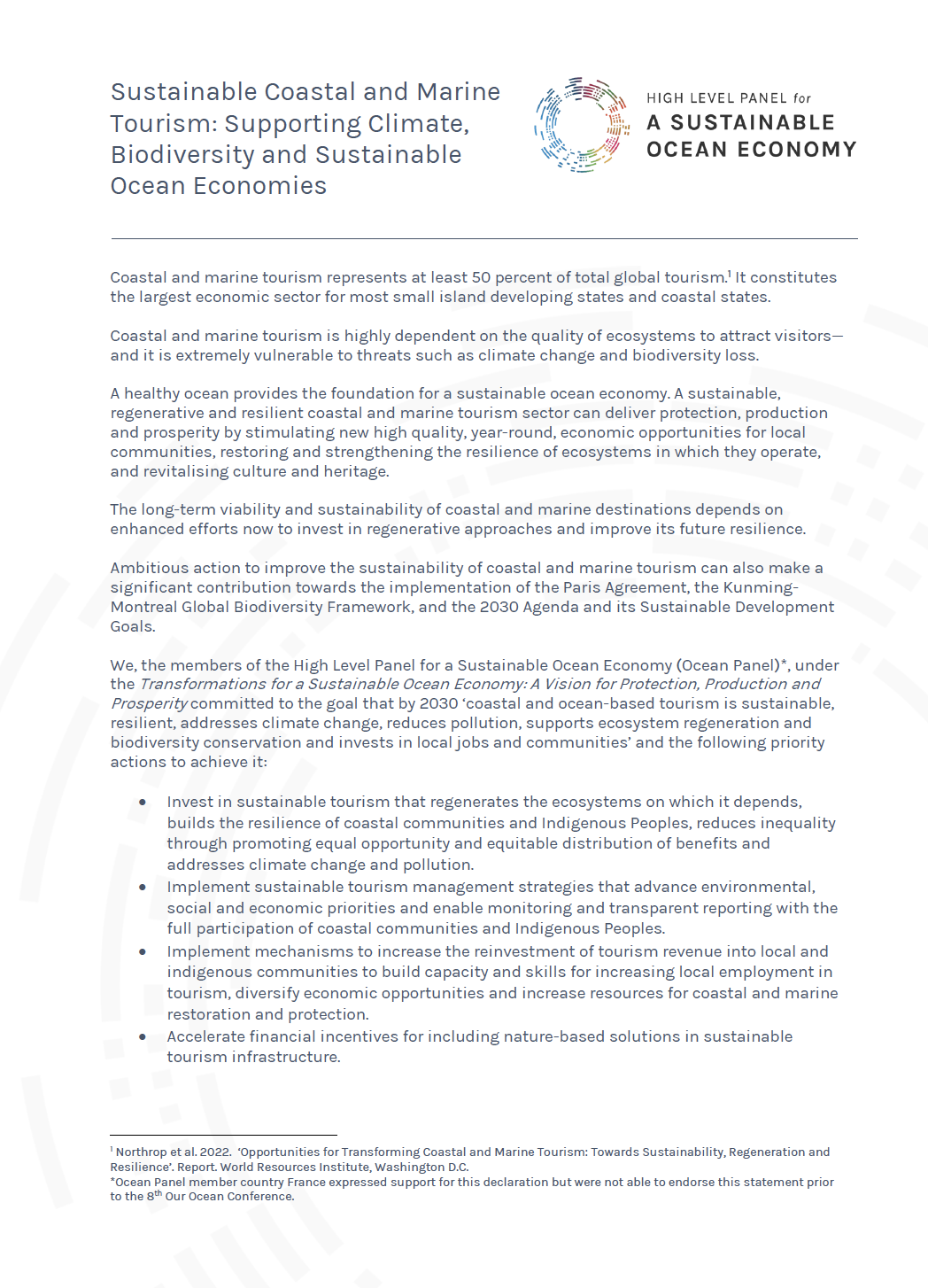
Full Report
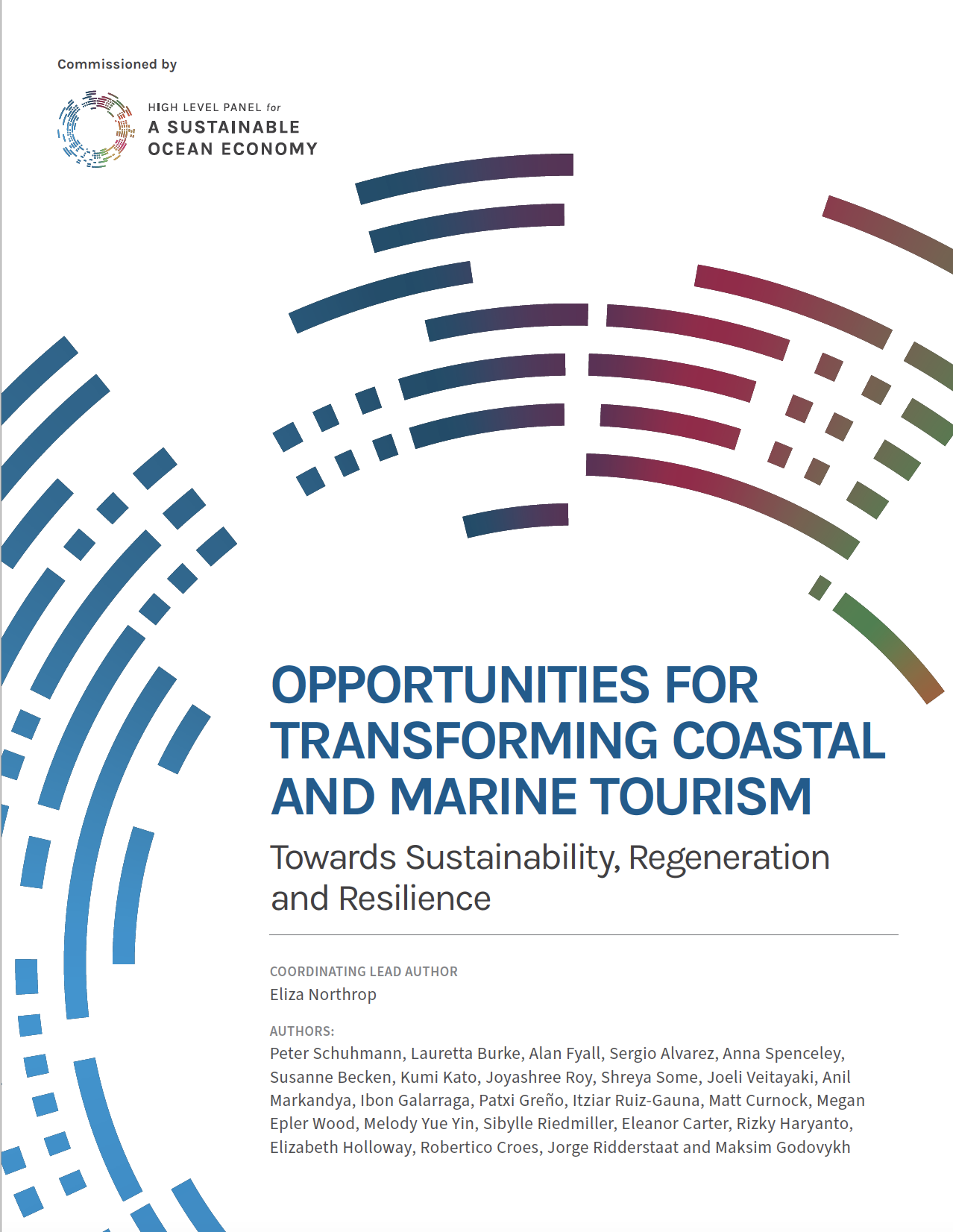
Summary
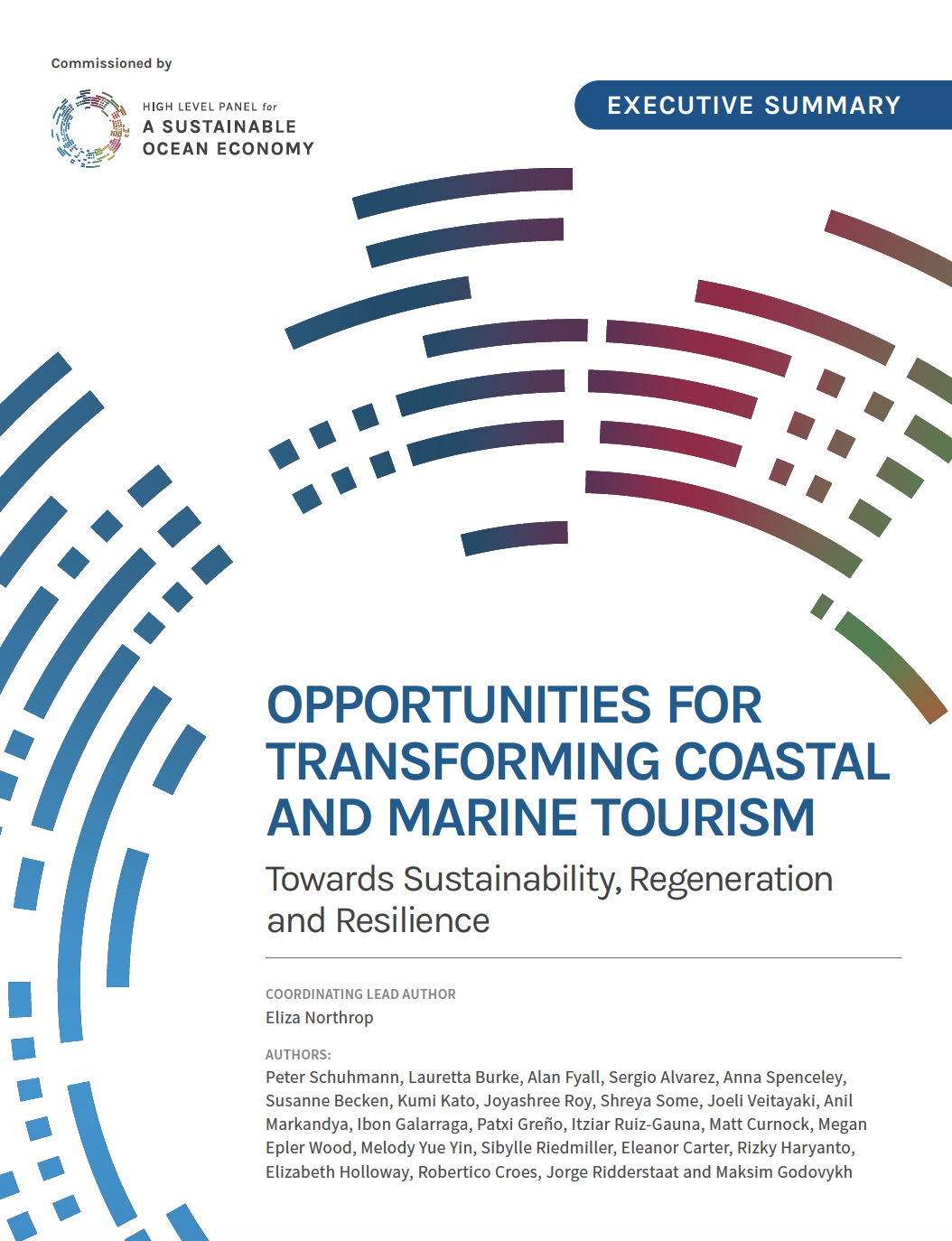
Booklet
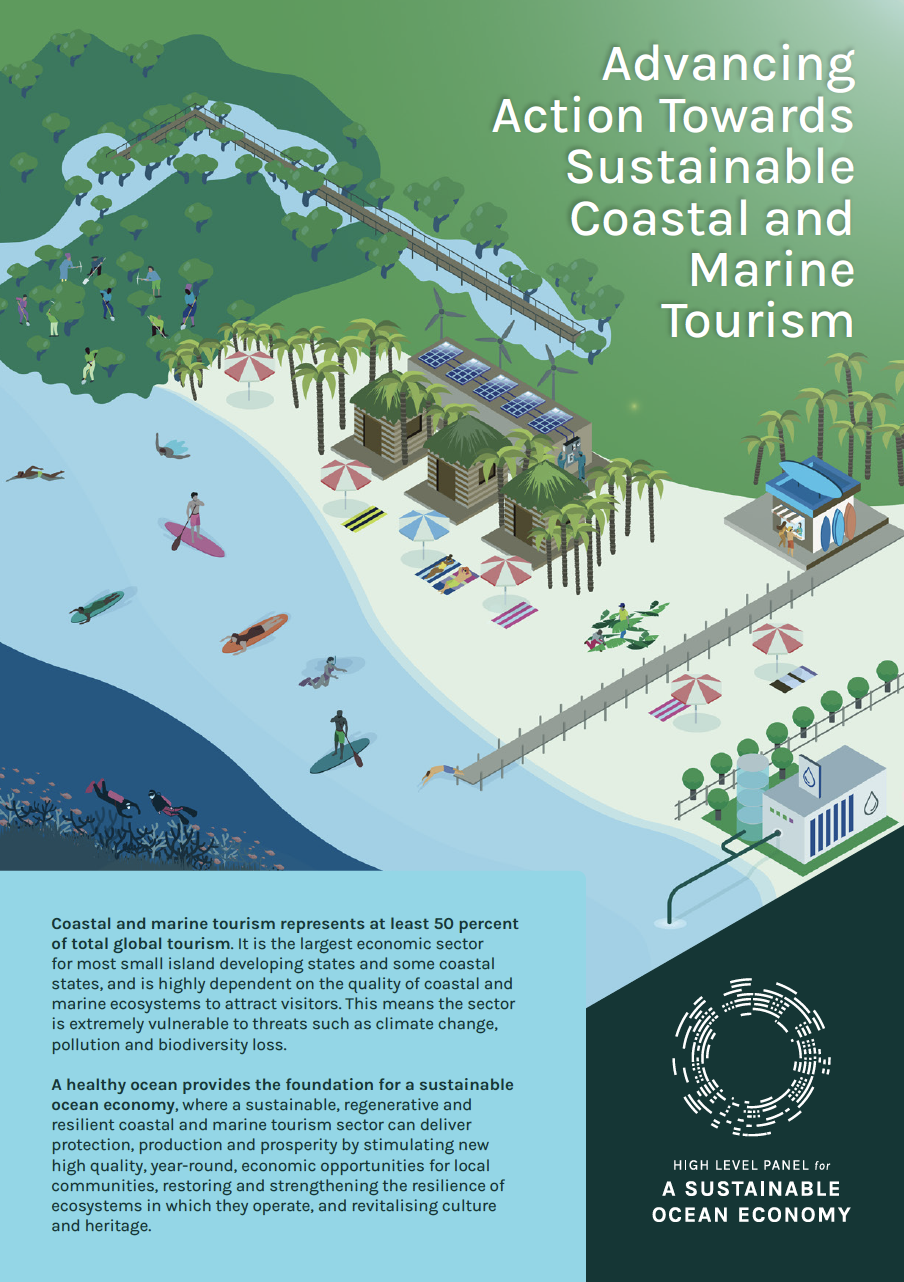
Expert Perspectives
Vision Setting: A Sustainable Coastal and Marine Tourism Sector in 2030 and 2050
What is sustainable coastal and marine tourism in 2030 and 2050? What are three key shifts needed by 2025 to achieve this ambitious vision?

Daniel Gschwind
Chief Executive, Queensland Tourism Industry Council

Gloria Fluxa Thieneman
Vice-Chairman & CSO, Iberostar Group

Randy Durband
CEO, Global Sustainable Tourism Council (GSTC)

Gloria Làzaro
Programme Officer en Plan Bleu (UNEP/MAP)

Caroline Tippett
Vice President of Ocean Markets and Finance, World Wildlife Fund
Building Back Better: A Catalyst for Change
Why does the global pandemic offer an unprecedented opportunity for transformation for coastal and marine tourism? What are the most promising opportunities and what are the challenges that must be overcome to seize these opportunities?

Zoritsa Urosevic
Executive Director, UNWTO

Simon Milne
Director, New Zealand Tourism Research Institute, Auckland University of Technology

Sarah Fangman
Florida Keys National Marine Sanctuary Superintendent

Jeremy Sampson
CEO of the Travel Foundation

Sam Teicher
Co-Founder, Coral Vita
Transformation: The Role of Coastal and Marine Tourism in a Sustainable Ocean Economy
How can coastal and marine tourism be a foundational building block for supporting countries to transition to a sustainable ocean economy?

Valerie Hickey
Global Director of the Environment, Natural Resources and Blue Economy Global Practice, World Bank

Republic Of Namibia
Ministry of Environment, Forestry and Tourism

Nathalie Corredor
SVP Corporate Development, Four Seasons Hotels and Resorts

Caitrin O’Brien
VP Environmental, Social and Governance (ESG), Four Seasons Hotels and Resorts

Sue Snyman
Director of Research, School of Wildlife Conservation, The African Leadership University
Planning: Innovation in Sustainable Ocean Planning to Incentivize a Shift to Sustainable Coastal and Marine Tourism
How have planning instruments and governance mechanisms been a catalyst for change in the coastal and marine tourist sector? What are examples of innovation that could be replicated or scaled?

Amy Trice
Director, Ocean Planning Ocean Conservancy

Darrell Wade
Co-founder and Chairman of Intrepid Travel
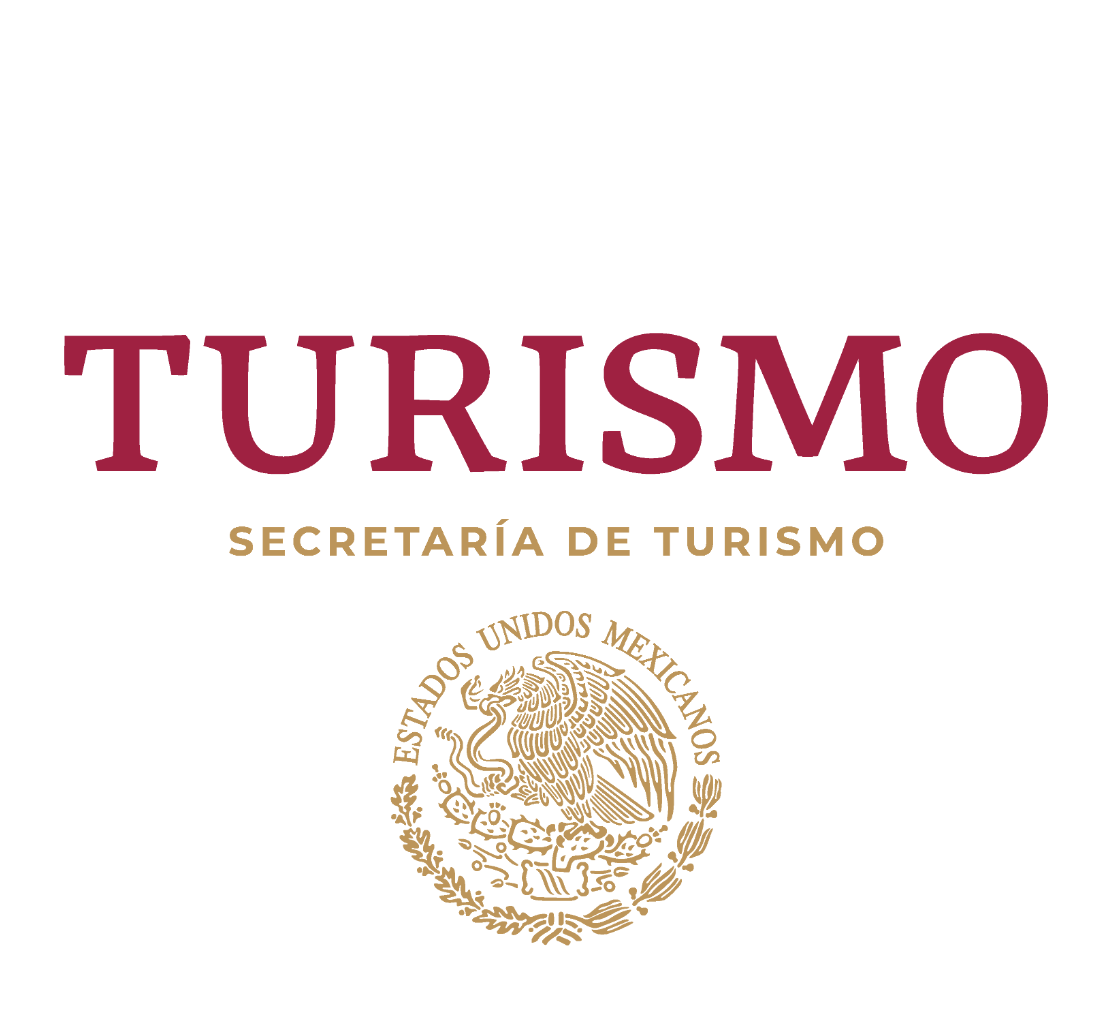
Ministry of Tourism and Ministry of Foreign Affairs, Mexico
Secretaría de Turismo y Secretaría de Relaciones Exteriores de México

Patricio Azcárate Díaz de Losada
Secretary General, Responsible Tourism Institute
Equity: Ensuring Everyone Can Benefit from Coastal and Marine Tourism
What has been effective in increasing the benefits that flow to local communities, reducing the impacts of coastal and marine tourism on local communities and avoiding widening inequalities?

Dr. Fanny Douvere
Sustainable Ocean Planning & Management Lead at IOC-UNESCO

Freya Higgins-Desbiolles
Visiting Professor Centre for Research and Innovation in Tourism, Taylor’s University (Malaysia); Adjunct Associate Professor Department of Recreation and Leisure Studies, University of Waterloo (Canada); Adjunct UniSA Business, University of South Australia (Australia)

Prof. Amran Hamzah
Professor in Tourism Planning and IUCN WCPA Regional Vice-Chair Southeast Asia

Marit Liv Miners
Co-founder of Misool Resort and Misool Foundation

Dr. Ray Mutinda Ndivo
Senior Tourism Lecturer, Murang’a University of Technology, Kenya; Tourism Consultant, UN Economic Commission for Africa
Voices: Inclusive and Participatory Models for Coastal and Marine Tourism
What tools or mechanisms have been effective in creating opportunities for impactful engagement of stakeholders in the development of coastal and marine tourism? How do these tools or mechanisms need to be tailored to ensure active inclusion of particularly vulnerable or disenfranchised members of the community?

The Honourable Randy Boissonnault
Minister of Tourism and Associate Minister of Finance, Canada

Lisa Bishop
President, Friends of Hanauma Bay

Joyatri Ray
Director, Equitable Tourism Options

Suma TR
State representative, Kerala; Lead, Protected Areas, Communities and Tourism
Financing: Connecting Ambition with the Means to Achieve Sustainability
What finance mechanisms exist to support investment in sustainable coastal and marine tourism models and overcome key barriers to achieving scale? What else is needed?

Kathryn J Mengerink JD, PhD
Executive Director, Waitt Institute

Shaun Mann
Senior Private Sector Specialist, The World Bank Group

Louise Twining-Ward
Senior Private Sector Specialist, The World Bank Group

Andrea Bacher
Independent Consultant and Senior Advisor, Sustainable Blue Economy and Finance, Clima Capital Partners

Eleanor Carter
Founder & Executive Director, Sustainable Solutions International Consulting (SSIC); Co-Director Chumbe Island Coral Park

Sibylle Riedmiller
Founder-Director of Chumbe Island Coral Park; Chair of the Conservation Committee on the Board of Directors of the Hotels Association of Tanzania (HAT).
Resilience: Ensuring a Future for Coastal and Marine Tourism
How can the resilience of coastal and marine tourism be strengthened and how can coastal and marine tourism help strengthen the resilience of host destinations and communities? Consider resilience to exogenous threats, such as climate change, as well as unpredictable future shocks, such as global pandemics.

Sally Yozell
Senior Fellow & Director, Environmental Security Program, The Stimson Center

Wouter Schalken
Asian Development Bank Senior Sustainable Tourism Specialist

Graham Harper
Pacific Asia Travel Association, Special Advisor—Sustainability & Social Responsibility

Mark Spalding
Senior Marine Scientist, The Nature Conservancy

Bruce Prideaux
Professor at Central Queensland University, Australia
Collaboration: Building Partnerships for Innovation and Success
How can collaboration and partnerships support the shift to sustainability? Consider the role of public private partnerships to promote innovation and overcome barriers to entry and/or regional collaboration as a mechanism to reduce risk? What are examples of success?

Carina Ren, PhD
Associate Professor, Department of Culture and Learning; Head, Aalborg University Arctic

Melinda Watt
Vice President Relationship Management & Chief Scientist, EarthCheck

Marina Novelli
Professor at University of Brighton, UK
Cruises: The Future of Cruise Tourism
What does sustainability mean for the cruise industry and how can this be achieved in light of the impact the pandemic continues to have on the cruise industry? What is the future of cruise tourism?

Daniel Skjeldam
CEO, Hurtigruten Group

Honourable Edmund Bartlett, CD, MP
Minister of Tourism of Jamaica

Ross A. Klein, PhD
Professor, Memorial University of Newfoundland, Canada

Joseph M. Cheer, PhD
Co-editor-in-Chief, Tourism Geographies, and Professor of Sustainable Tourism, Center for Tourism Research, Wakayama University, Japan



